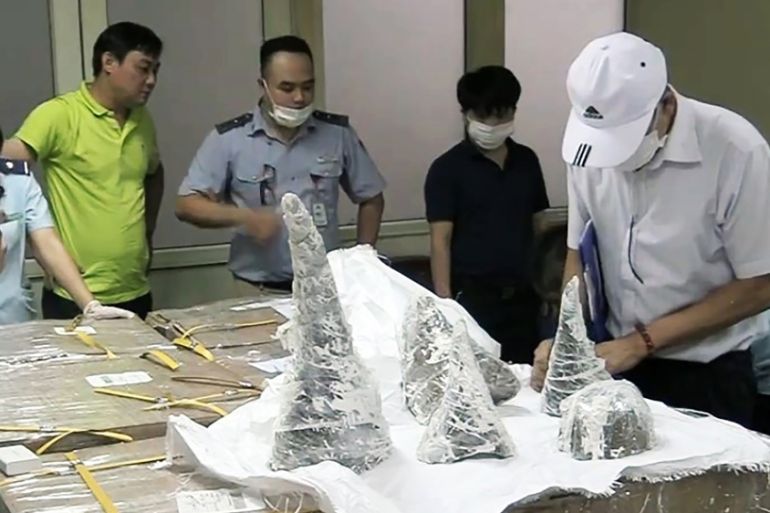Vietnam seizes 55 pieces of rhino horn hidden in plaster
The 125-kilogram haul discovered at Hanoi’s Noi Bai airport on same day suspects found with seven tiger carcasses.

Fifty-five pieces of rhino horn have been found encased in plaster at an airport in the Vietnamese capital, Hanoi, authorities said on Sunday, as the country tries to crack down on sophisticated wildlife smuggling routes.
Vietnam is a major consumer of rhino horn, which is believed to have medical powers, and a transit point for elephant ivory to consumers mostly in China and the United States, destined to be made into jewellery and home decorations.
Keep reading
list of 4 itemsLost Futures
Photos: Greek valley that became a lake stirs drought debate
Botswana threatens to send 20,000 elephants to Germany
The 125-kilogram haul of rhino horn discovered at Hanoi’s Noi Bai airport on Thursday was found after the carefully disguised shipment aroused suspicion.
“It took half a day to break them open,” a security source told AFP on Sunday. It was not immediately clear which country the shipment originated from.
The parts were discovered on the same day police arrested a key wildlife-trafficking suspect and two other men after seven frozen tiger carcasses were discovered in their vehicle in a parking lot in Vietnam.
The busts follow a record seizure in Singapore a week ago of nearly nine tonnes of ivory and a huge stash of pangolin (anteater) scales destined for Vietnam.
Elephant tusks, pangolins and tiger parts are also part of the black market, but rhino horn is especially prized, with one kilogram fetching up to $60,000.
Poachers in Africa have decimated wild rhino populations to meet demand despite the trade being banned globally in the 1970s.
Only about 29,000 rhinos survive in the wild, down from half a million at the beginning of the 20th century, according to conservationists.
Hanoi has long vowed to stem the flow of illegal wildlife crisscrossing its borders but experts say the black market persists because of weak law enforcement.
Earlier this month, the United Nations said organised crime syndicates in Southeast Asia were raking in billions of dollars from the illegal trafficking of drugs, wildlife, counterfeit goods and people.
“Governments in Southeast Asia should review their criminal legislation to ensure that law enforcement agencies are fully authorised to follow the financial flows related to wildlife crime and to prosecute money-laundering offences,” the report said.